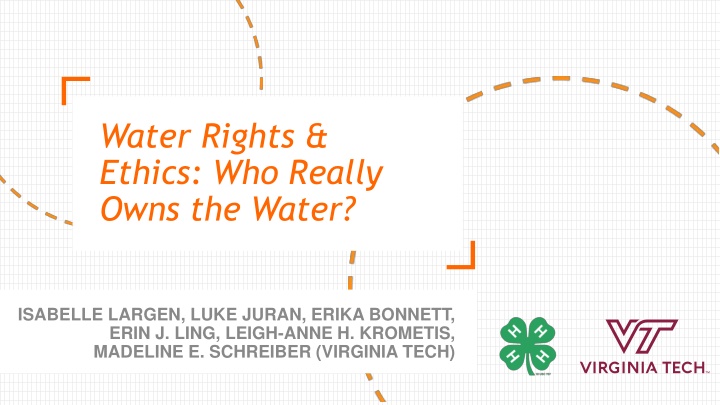
Unveiling Water Rights and Ethics: Ownership and Responsibilities
Delve into the complexities of water rights and ethics through a thought-provoking scenario involving Tasty Water's request to pump water from a municipal well. Explore stakeholder discussions on water usage limits, payment, and future rights. The case study of Evart, Michigan, where Nestle pumped billions of gallons of water, adds a real-world dimension to the debate on water ownership and sustainability.
Download Presentation

Please find below an Image/Link to download the presentation.
The content on the website is provided AS IS for your information and personal use only. It may not be sold, licensed, or shared on other websites without obtaining consent from the author. If you encounter any issues during the download, it is possible that the publisher has removed the file from their server.
You are allowed to download the files provided on this website for personal or commercial use, subject to the condition that they are used lawfully. All files are the property of their respective owners.
The content on the website is provided AS IS for your information and personal use only. It may not be sold, licensed, or shared on other websites without obtaining consent from the author.
E N D
Presentation Transcript
Water Rights & Ethics: Who Really Owns the Water? ISABELLE LARGEN, LUKE JURAN, ERIKA BONNETT, ERIN J. LING, LEIGH-ANNE H. KROMETIS, MADELINE E. SCHREIBER (VIRGINIA TECH)
Goals 1. Gain a deeper understanding of issues surrounding water rights, water development, and related water issues. 2. Act out a fictional scenario related to your local community and environment. 2
Pre-Activity Questions Who has the right to water? Credit: Vincent, 2007. Who owns the water or the right to develop water resources? Should there be limits on water use? 3
The Scenario Tasty Water bottling company has requested rights to pump water from a municipal well in Anytown, USA. It seeks to pump 400 gallons per minute. Tasty Water will transport water pumped from the municipal well to a factory in the neighboring town to be bottled and sold to the public. Tasty Water believes it should be allowed to purchase water just like the other residents of Anytown. Credit: Pilsak, 2005. A public meeting has been called consisting of representatives from four stakeholder groups: (1) Tasty Water, (2) Town Council, (3) a local environmental organization, (4) a group of concerned citizens. 4
Stakeholder Discussion Break into four stakeholder groups. Read your group s description and discuss the following: Should Tasty Water be allowed to pump water from the town s well? How much water should Tasty Water be allowed to pump? How much should Tasty Water pay for the water? Can Tasty Water s pumping rights be changed in the future or taken away? 5
Large Group Discussion Stakeholder groups share stances. Openly discuss issues. Propose policy options and vote on a final resolution. Credit: Rafizeldi, 2013. 6
The Actual Scenario: Evart, Michigan From 2004-2015, Nestle pumped a total of 3.4 billion gallons of water from a municipal well in Evart, Michigan. Credit: Flag map of Michigan 2012. The water was transported to a neighboring town for bottling, and only a few new jobs were created in the town and region. Sources: Ellison, 2021; Taillard, 2018; Winter, 2017. 7
The Actual Scenario: Evart, Michigan Nestle paid a one-time permitting fee of $5,000 and a yearly fee of $200 to pump roughly 576,000 gallons of water per day. The rate is cheaper than what town residents paid for water: Nestle paid 0.000347 cents per gallon. A typical rate for citizens was 0.003 cents per gallon (roughly 10 times greater than Nestle s rate). Meanwhile, the bottles of water were sold for greater than 1,000 times the price Nestle paid to purchase the water. 8 Sources: Ellison, 2021; Taillard, 2018; Winter, 2017.
The Actual Scenario: Evart, Michigan In 2018, Nestle was granted a new permit to pump 400 gallons per minute from the municipal well. The permit was eventually modified after extensive review, public outcry, and sale of the company. The current permit allows for the extraction of 288 gallons per minute (as a comparison, the average American uses roughly 100 gallons per day). Sources: Ellison, 2021; Taillard, 2018; Winter, 2017. 9
The Actual Scenario: Evart, Michigan How do you feel about the outcome in this real-life situation? Are there some groups that were not considered or represented? Do you think scenarios like this might be occurring in other communities throughout the U.S.? How might the issues be different in different locations? 10
Local Applications What other industries and activities, besides bottling water, use large quantities of water? Who are the largest water users in this region? Given the scenario of Evart, how would you feel if this happened in your town? Credit: Salazar210 2018. 11
References Ellison, G. 2021. Nestle water owners return Michigan permit, plan new withdrawal. M Live, October 20, 2021. https://www.mlive.com/public-interest/2021/10/nestle-water-owners-return-michigan-permit-plan-new- withdrawal.html. Flag map of Michigan. 2012. https://commons.wikimedia.org/wiki/File:Flag_map_of_Michigan.svg, via Wikimedia Commons. Licensed under CC BY-SA 3.0. http://creativecommons.org/licenses/by-sa/3.0/. Pilsak, W. J. 2005. https://en.wikipedia.org/wiki/Total_dissolved_solids#/media/File:Stilles_Mineralwasser.jpg. Licensed under CC BY-SA 3.0. http://creativecommons.org/licenses/by-sa/3.0/. Rafizeldi, M. 2013. https://commons.wikimedia.org/wiki/File:Discussion.png. Licensed under CC BY-SA 3.0. https://creativecommons.org/licenses/by-sa/3.0. Salazar210 at English Wikipedia. 2008. https://commons.wikimedia.org/wiki/File:Blue_question_mark.jpg. CC BY- SA 3.0. https://creativecommons.org/licenses/by-sa/3.0. Taillard, M. Opinion: Nestl water deal is bad economics and bad policy for Michigan. Bridge Michigan. April 3, 2018. https://www.bridgemi.com/guest-commentary/opinion-nestle-water-deal-bad-economics-and-bad-policy- Michigan. Vincent. 2007. The Rouvre River. Public domain. https://commons.wikimedia.org/wiki/File:La_Rouvre.JPG. Winter, C. 2017. Nestl Makes Billions Bottling Water It Pays Nearly Nothing For. Bloomberg. September 21, 2017. https://www.bloomberg.com/news/features/2017-09-21/nestl-makes-billions-bottling-water-it-pays-nearly- nothing-for. 12

